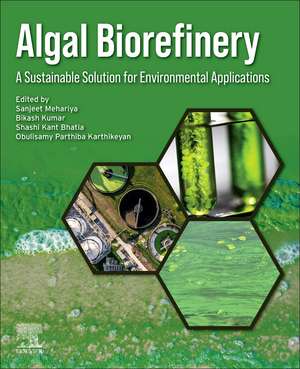Algal Biorefinery: A Sustainable Solution for Environmental Applications
Editat de Sanjeet Mehariya, Bikash Kumar, Shashi Kant Bhatia, Obulisamy Parthiba Karthikeyanen Limba Engleză Paperback – apr 2025
This comprehensive book will examine dedicated state-of-the-art information on the topic of how algae can act as a cushion against climate change. It will also explain how algal-based biorefineries can act as a potential solution to climate change, lack of natural resources, and environmental pollution
- Elucidates algal biorefinery as a sustainable solution for carbon emission reduction and fossil fuels alternatives.
- Offers up-to-date information on algal-based wastewater treatment and resource recovery to assist in climate change.
- Provides flowcharts, schematic diagrams, and figures showing mechanisms and processes for the depiction of strategies for algal-based technologies.
- Examines the environmental impact assessment of existing and developing algal-based technologies for future environmental sustainability.
Preț: 787.71 lei
Preț vechi: 1026.40 lei
-23% Nou
Puncte Express: 1182
Preț estimativ în valută:
150.77€ • 156.80$ • 126.34£
150.77€ • 156.80$ • 126.34£
Carte nepublicată încă
Doresc să fiu notificat când acest titlu va fi disponibil:
Se trimite...
Preluare comenzi: 021 569.72.76
Specificații
ISBN-13: 9780443239670
ISBN-10: 0443239673
Pagini: 408
Dimensiuni: 216 x 276 mm
Editura: ELSEVIER SCIENCE
ISBN-10: 0443239673
Pagini: 408
Dimensiuni: 216 x 276 mm
Editura: ELSEVIER SCIENCE
Cuprins
1. Understanding carbon emission and minimizing carbon footprint via algal biomass-based biorefinery technologies i.e., Algal biomass-based carbon sequestrations and its impacts on environment conservation.
2. Algal biomass as a potential source of food, feed medicine utilizing global temperature rise and carbon emission as potential substrate and energy source
3. The potential of Algae from marine sources for future large-scale application to meet food, feed and environmental sustainability issues.
4. Algal biomass as potential source of food, feed medicine utilizing global temperature rise and carbon emission as potential substrate and energy source.
5. Recovery of high-value carotenoids from microalgae: A health-beneficial metabolites.
6. Algae as potential source of biofuels and biocommodities for industrial application and climate change mitigation.
7. Unlocking the Bioenergy Potential of Algal Biomass: Microbial Cell Factories and Innovative Fermentation Strategies.
8. Cultivation of microalgae on anaerobic digestate to produce sustainable products: Two case studies
9. Decarbonizing the oil and gas industry via algal biorefinery: Drivers and barriers analysis using q-rung orthopair fuzzy DEMATEL approach
10. Characteristics of Waste and their Treatment via Algal Technologies with Special Emphasis on Current Status and Prospects in Environmental Remediation and Acclimatizing to Changing Climate.
11. Microalgae-mediated pollutant removal from wastes of pharmaceutical and personal care products (PPCP) industry – current trends.
12. Biotechnological advances for wastewater treatment and resource recovery using algae and cyanobacteria
13. Role of algal based technologies in domestic wastewater treatment for resources recovery and water reuse.
14. Wastewater treatment employing Microbial carbon-capture cells with concomitant bioenergy production and valuable product recovery.
15. Can algal based technologies help achieve zero liquid discharge in industrial wastewater treatment?
16. Advances in technologies for biotransformation of algal biomass into high value products.
17. Bottlenecks in applications of algal-based technologies in the path towards industrial commercialization.
18. Bottlenecks and opportunities towards practical aspects of microalgae-based biorefineries.
19. Life cycle assessment and techno-economic sustainability assessment of existing algal-based technologies for future implications.
20. Immobilized microalgae cultivation systems: Pros and cons concerning environmental impact assessment (EIA).
21. Future Prospect of Development of Integrated Wastewater and Algal Biorefineries and Its Impact on Biodiversity and Environment
